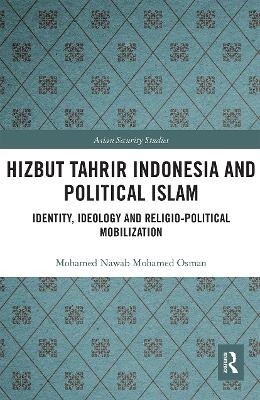
Hizbut Tahrir Indonesia and Political Islam
Identity, Ideology and Religio-Political Mobilization
Seiten
2020
Routledge (Verlag)
978-0-367-66666-8 (ISBN)
Routledge (Verlag)
978-0-367-66666-8 (ISBN)
This book offers a timely examination of Hizbut Tahrir Indonesia (HTI), a chapter of the transnational movement Hizb ut-Tahrir (HT), whose key aim is the revival of the caliphate.
It cautions against an overly simplistic read of a group like HTI and political Islam in Indonesia. While there is much to laud, particularly with regard to how leaders in Indonesia have attempted to counteract Islamist extremism, insofar as the trajectory of non-violent Islamism in Indonesia is concerned there are clear reasons for apprehension. Groups like the HTI have been adept at using the democratic space in Indonesia to propound their illiberal objectives, including encouraging the curtailment of Indonesian art forms deemed un-Islamic, and more importantly pushing for certain Islamic sects, such as the Ahmadiyahs, to be banned. Yet, despite its extreme posturing, HTI is
accepted as a mainstream Muslim organization. As such, the Indonesian chapter of Hizb ut-Tahrir represents a unique case: unlike other chapters, which are deemed extreme and fringe, HTI, though radical, still exists within the space provided by the Indonesian religio-political landscape.
This book offers new insights into HTI’s history, organizational structure and ideology, adding considerable new details about HTI and correcting errors in existing literature, while directing its primary focus on explaining HTI’s rapid growth in Indonesia. The central argument is that the key to understanding HTI’s growth lies in the role collective identity plays in attracting new members and retaining its existing members within the party. Factors such as institutional and non-institutional opportunities within the Indonesian political system, HTI’s resource mobilization strategies and the anti-systemic ideology of HTI serve as political, organizational and religious incentives for individuals to join the party and launch collective action. This goes on to emphasize and show that collective identity remains the most crucial factor in the party’s growth. Analysing this process of collective identity formation and its impact on recruitment and membership retention is central to this book.
This book will be of much interest to students of Southeast Asian politics, regional security, political Islam, and International Relations in general.
It cautions against an overly simplistic read of a group like HTI and political Islam in Indonesia. While there is much to laud, particularly with regard to how leaders in Indonesia have attempted to counteract Islamist extremism, insofar as the trajectory of non-violent Islamism in Indonesia is concerned there are clear reasons for apprehension. Groups like the HTI have been adept at using the democratic space in Indonesia to propound their illiberal objectives, including encouraging the curtailment of Indonesian art forms deemed un-Islamic, and more importantly pushing for certain Islamic sects, such as the Ahmadiyahs, to be banned. Yet, despite its extreme posturing, HTI is
accepted as a mainstream Muslim organization. As such, the Indonesian chapter of Hizb ut-Tahrir represents a unique case: unlike other chapters, which are deemed extreme and fringe, HTI, though radical, still exists within the space provided by the Indonesian religio-political landscape.
This book offers new insights into HTI’s history, organizational structure and ideology, adding considerable new details about HTI and correcting errors in existing literature, while directing its primary focus on explaining HTI’s rapid growth in Indonesia. The central argument is that the key to understanding HTI’s growth lies in the role collective identity plays in attracting new members and retaining its existing members within the party. Factors such as institutional and non-institutional opportunities within the Indonesian political system, HTI’s resource mobilization strategies and the anti-systemic ideology of HTI serve as political, organizational and religious incentives for individuals to join the party and launch collective action. This goes on to emphasize and show that collective identity remains the most crucial factor in the party’s growth. Analysing this process of collective identity formation and its impact on recruitment and membership retention is central to this book.
This book will be of much interest to students of Southeast Asian politics, regional security, political Islam, and International Relations in general.
Mohamed Nawab Mohamed Osman is Assistant Professor and Coordinator of the Malaysia Program at the S. Rajaratnam School of International Studies, a Graduate School of Nanyang Technological University, Singapore.
1: Comprehending the Phenomenon of Hizb Ut-Tahrir in Indonesia
2: The Selected Elites of a Global Islamic Party: A History of Hizb Ut-Tahrir
3: Unravelling the History of Hizbut Tahrir Indonesia
4: Capitalizing on Opportunities for the Caliphate
5: Procuring Resources for the Party
6: The Power of Ideas: The Ideology of Hizbut Tahrir Indonesia
7: Developing a Hizbi Identity
8: Conclusion
| Erscheinungsdatum | 01.10.2020 |
|---|---|
| Reihe/Serie | Asian Security Studies |
| Verlagsort | London |
| Sprache | englisch |
| Maße | 156 x 234 mm |
| Gewicht | 453 g |
| Themenwelt | Sozialwissenschaften ► Politik / Verwaltung ► Europäische / Internationale Politik |
| ISBN-10 | 0-367-66666-9 / 0367666669 |
| ISBN-13 | 978-0-367-66666-8 / 9780367666668 |
| Zustand | Neuware |
| Haben Sie eine Frage zum Produkt? |
Mehr entdecken
aus dem Bereich
aus dem Bereich
Studienbuch
Buch | Hardcover (2023)
De Gruyter Oldenbourg (Verlag)
44,95 €
erfolgreiche Interessenvertretung durch Prozesskompetenz im komplexen …
Buch | Hardcover (2023)
Wiley-VCH (Verlag)
42,00 €


